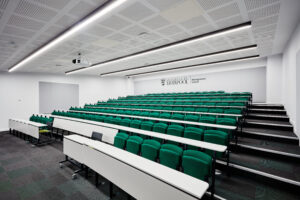Clearing 2025
Clearing places have been filled on this course for 2025 entry.
Accounting and Finance with a Year in Industry
UCAS code N401
- Study mode
- Full-time
- Duration
- 4 years
- Start date and application deadlines
-
- Start date
Clearing places have been filled on this course for 2025 entry.
UCAS code N401
You can expect to gain a foundation for deeper study of accounting issues in addition to having an understanding of fundamental accounting and finance concepts and principles by undertaking our Accounting and Finance programme.
It is an exciting time to join us, our Accounting and Finance programmes are ranked: 10th from 98 providers, Times Good University Guide (a rise of 4 places from last year). We are 11th in Guardian League tables 2025 (up a place from last year), and outperformed the sector benchmarks for all 7 question themes for NSS 2024.
*based on subject area.
Taught by professionally qualified accountants who have a range of experience and industry links, you can expect our Accounting and Finance BSc programme to provide you with the latest knowledge from those that have applied it in the business world. By selecting this highly accredited course, you will gain an advantage in a range of careers including: accountancy, investment banking, asset management and insurance.
After you’ve covered the core elements of the programme, we give you the flexibility to gain exposure to specialist areas such as auditing, taxation and strategy to a level equivalent to the ICAEW professional stage.
The University of Liverpool Management School holds accreditation from AACSB, AMBA and EQUIS. This makes it one of an elite group of institutions worldwide to hold the gold standard triple accreditation.
With close industry links, excellent teaching, and quality content this course is accredited by the professional accountancy bodies including the Institute of Chartered Accountants in England and Wales (ICAEW), Association of Chartered Certified Accountants (ACCA), Chartered Institute of Management Accountants (CIMA), Chartered Institute of Public Finance Accountants (CIPFA), and Institute of Charted Accountants of Scotland (ICAS).

In aligning our Accounting and Finance programme with the Association of Chartered Certified Accountants (ACCA), our students are eligible for exemptions from specific ACCA exams up to the Strategic Professional Level papers. This will fast-track their journey to membership once they graduate – so they can start their careers in finance and accountancy more quickly.

This programme is accredited by Chartered Institute of Management Accountants (CIMA) which will give you further skills and understanding on how businesses operate, are managed, how to create strategies and how people work together.

Chartered Institute of Public Finance and Accounting (CIPFA) exemptions are available for our Accounting and Finance graduates.

The Institute of Chartered Accountants in England and Wales (ICAEW) works with the University of Liverpool to grant credit for prior learning (also known as exemptions) for relevant content covered in undergraduate and postgraduate degrees.
Once you have finished your degree you will only have to complete any outstanding modules, the compulsory practical work experience element of the ACA and demonstrate your ethical and professional development, to qualify as an ICAEW Chartered Accountant.

ICAS is a global professional body for Chartered Accountants, also known as the Institute of Chartered Accountants of Scotland. Our 23,000 Members and 3,700 Chartered accounting students form a leading business community that spans industries and time zones and is packed with local heroes and corporate leaders.

We’re proud to announce we’ve been awarded a Gold rating for educational excellence.
Discover what you'll learn, what you'll study, and how you'll be taught and assessed.
Your first year of study will provide you with a foundation for deeper study of accounting issues in the following stages of the programme in addition to being able to demonstrate an understanding of fundamental accounting and finance concepts and principles whilst being able to analyse introductory quantitative and qualitative techniques. You will also begin to develop key employability skills required for roles where personal responsibility is necessary.
This programme has been designed to ensure that our graduates can apply for the maximum number of exemptions from professional accounting qualifications upon completing their degree studies. This means that many of our modules, including all those that you take in year one, are compulsory.
Students will take ACFI111 or ACFI112 in semester one.
Programme details and modules listed are illustrative only and subject to change.
In your second year of study, you will start to build upon the foundations you created in your first year and will be able to demonstrate an understanding, knowledge and application of accounting and finance concepts and principles across a range of business contexts. With an increased expertise in broader areas of accounting and finance you will also understand key accounting methodology as well as the consequences and ethical impact of decision-making.
Students will take one of the optional modules listed in semester one of year two.
| Compulsory modules | Credits |
|---|---|
| ACCOUNTING THEORY (ACFI202) | 15 |
| AUDIT AND ASSURANCE (ACFI210) | 15 |
| BUSINESS LAW (ACFI211) | 15 |
| FINANCIAL MANAGEMENT (ACFI204) | 15 |
| FINANCIAL REPORTING 1 (ACFI201) | 15 |
| MANAGEMENT ACCOUNTING (ACFI203) | 15 |
| TAX COMPLIANCE (ACFI212) | 15 |
| Optional modules | Credits |
|---|---|
| BUSINESS ETHICS (PHIL271) | 15 |
| ENTREPRENEURSHIP (ULMS252) | 15 |
| THEORY OF THE FIRM (ECON254) | 15 |
| ECONOMETRICS FOR FINANCE 1 (ACFI225) | 15 |
Programme details and modules listed are illustrative only and subject to change.
The third year of your programme is spent on placement. You will complete a year-long graduate-level placement, providing valuable work experience and an opportunity to further enhance the skills and attributes sought after by top employers.
You can apply for UK-based placements with a large organisation or smaller company or even seek a placement overseas. You will be visited at least twice by University staff whilst on placement with support from the Placement Team throughout and complete related assessments in May.
Further information about the year in industry is available on the Management School website.
| Compulsory modules | Credits |
|---|---|
| ULMS PLACEMENT YEAR (ULMS299) | 120 |
Programme details and modules listed are illustrative only and subject to change.
In year final year, you will be able to demonstrate an understanding of a wide range of the contexts in which accounting and finance operates and develop your technical knowledge of the main current techniques and practices to an advanced level in areas such as financial reporting; management accounting; finance; auditing and taxation. You will also undertake projects analysing real businesses enabling you to develop and demonstrate key skills desired by graduate employers.
Your year four optional modules will give you the opportunity to explore advanced areas of accounting and finance, depending on your interest. This combination of advanced technical knowledge, analysis current practice and in depth study of specialised areas leaves you well prepared to enter the workplace or to undertake further study.
Students will take one of the following optional modules in semester one of year four: ACFI305, ACFI310, ACFI315.
Students will take one of the remaining listed optional modules in semester two of year four.
| Compulsory modules | Credits |
|---|---|
| ADVANCED AUDITING (ACFI301) | 15 |
| STRATEGIC MANAGEMENT ACCOUNTING (ACFI303) | 15 |
| BUSINESS FINANCE (ACFI304) | 15 |
| BUSINESS STRATEGY (ACFI312) | 15 |
| CORPORATE REPORTING AND ANALYSIS (ACFI302) | 15 |
| FINANCIAL REPORTING 2 (ACFI309) | 15 |
Programme details and modules listed are illustrative only and subject to change.
Modules are taught using the latest active learning techniques including business simulations, real-world case studies, social media, interactive participation software, lecture capture and real-time financial and business data using our Bloomberg Trading Floor. The principal forms of teaching are lectures and seminars with lectures normally being supported by material such as hand-outs and presentations.
Seminars give the opportunity for detailed discussion of a topic under the direction of a tutor. You are normally expected to prepare work in advance for seminars and may be expected to present work or give presentations from time to time. On some modules, such as quantitative techniques and IT, seminars may take the form of practical sessions using our PC suites.
All our degrees depend on you spending a good part of the week in private or group study in preparation for lectures and seminars. This involves making extensive use of the excellent library and IT facilities, just one minute’s walk away from the Management School.
Students on this course will be assessed through a combination of coursework and examinations. The exact weighting will vary from one module to another. As well as individual assignments and exams, you may also be assessed on group reports and presentations.
We have a distinctive approach to education, the Liverpool Curriculum Framework, which focuses on research-connected teaching, active learning, and authentic assessment to ensure our students graduate as digitally fluent and confident global citizens.
The Liverpool Curriculum framework sets out our distinctive approach to education. Our teaching staff support our students to develop academic knowledge, skills, and understanding alongside our graduate attributes:
Our curriculum is characterised by the three Liverpool Hallmarks:
All this is underpinned by our core value of inclusivity and commitment to providing a curriculum that is accessible to all students.
The qualifications and exam results you'll need to apply for this course.
| Qualification | Details |
|---|---|
| A levels |
ABB |
| GCSE |
GCSE Mathematics at grade 5/C and GCSE English at grade 4/C required. |
| BTEC Level 3 national extended diploma |
D*DD in a Business related subject. Business Related BTEC are:: Applied Law; Applied Psychology; Business, Accounting & Finance; Computing, Creative Media Production; Engineering, Enterprise & Entrepreneurship; Health & Social Care; Hospitality; ICT; Information Technology; Media; Public Services; Strategic Management & Leadership; Travel and Tourism. |
| BTEC combinations |
BTEC National Diploma D*D in a Business related subject plus B at A level; BTEC National Extended Certificate D plus AB at A level. Business Related BTEC are:: Applied Law; Applied Psychology; Business, Accounting & Finance; Computing, Creative Media Production; Engineering, Enterprise & Entrepreneurship; Health & Social Care; Hospitality; ICT; Information Technology; Media; Public Services; Strategic Management & Leadership; Travel and Tourism. |
| Welsh Baccalaureate Advanced |
B in the Welsh Baccalaureate, plus AB at A level. |
| Access |
Pass relevant Access to HE Diploma with 45 Level 3 credits with 33 at Distinction and 12 at Merit |
Studying with us means you can tailor your degree to suit you. Here's what is available on this course.
University of Liverpool students can choose from an exciting range of study placements at partner universities worldwide.
Immerse yourself in Chinese culture on an optional additional year at Xi'an Jiaotong Liverpool University in stunning Suzhou.
Take a semester of your second year of study at one of our worldwide partner institutions.
Spend a summer abroad on a study placement or research project at one of our worldwide partner institutions.
This course is also available without an included year in industry.
View Accounting and Finance BSc (Hons)
To spend a year in industry, you'll need to secure a placement with an organisation. If you're unable to find a placement, you'll continue with the standard version of the course without a year in industry.
Every student at The University of Liverpool can study a language as part of, or alongside their degree. You can choose:
Day-to-day teaching will take place in the University of Liverpool Management School; a world leading centre for management and leadership education and research and is one of an elite group of institutions worldwide to hold the gold standard ‘triple-crown’ accreditation. At the Management School, students have access to careers education, opportunities to work as well as excellent library and IT facilities, just one minute’s walk away.






From arrival to alumni, we’re with you all the way:

My student experience has always been about self-discovery. I am a completely different person now than I was when I first started. I’ve enjoyed meeting new people from diverse backgrounds, embracing fresh perspectives and challenging myself to grow both personally and academically.

Want to find out more about student life?
Chat with our student ambassadors and ask any questions you have.
This degree will provide you with the skills applicable to many financial professions and a range of different sectors. Graduates from the University of Liverpool Management School often go on to undertake postgraduate programmes within our school.
Typical roles our graduates have gone on to include:
You will be encouraged to undertake a Year in Industry as part of the four-year sandwich degree programme.
You can also explore taught postgraduate opportunities in our management school including:
4 in 5 agree their main activity after graduation fits in with their future plans.
(Graduate Outcomes, 2018-19.)
Your tuition fee covers almost everything, but you may have additional study costs to consider, such as books, specialist equipment or field trips.
Full-time place, per year - £9,535
Year in industry fee - £1,905
Year abroad fee - £1,430 (applies to year in China)
Full-time place, per year - £25,000
Year in industry fee - £1,905
Year abroad fee - £12,500 (applies to year in China)
The tuition fees shown are correct for 2025/26 entry. Please note that the year abroad fee also applies to the year in China.
Tuition fees cover the cost of your teaching and assessment, operating facilities such as libraries, IT equipment, and access to academic and personal support. Learn more about paying for your studies.
All students have the opportunity to spend a semester studying overseas during their second year, subject to your year one performance. If you elect to study abroad you will need to cover associated travel and living costs. University travel bursaries and subsistence grants are available.
Find out more about the additional study costs that may apply to this course.
We offer a range of scholarships and bursaries that could help pay your tuition and living expenses.
If you’re a UK student joining an undergraduate degree and have a household income below £35,000, you could be eligible for a Liverpool Bursary worth up to £2,000 for each year of undergraduate study.
Apply for an Asylum Seekers Scholarship and you could have your tuition fees paid in full and receive help with study costs. You’ll need to have applied for asylum in the UK, or be the dependant of an asylum seeker, and be joining an eligible undergraduate degree.
If you’ve spent 13 or more weeks in Local Authority care since age 14, you could be eligible for a bursary of £3,000 per year of study. You’ll need to be a UK student joining an eligible undergraduate degree and be aged 28 or above on 1 September in the year you start.
Are you a UK student with a Black African or Caribbean heritage and a household income of £25,000 or less? You could be eligible to apply for a Cowrie Foundation Scholarship worth up to £8,000 for each year of undergraduate study.
If you’re a UK student identified as estranged by Student Finance England (or the equivalent UK funding body), you could be eligible for a bursary of £1,000 for each year of undergraduate study.
Joining a School of Biosciences degree and have a household income of less than £25,000? If you’re a UK student, you could apply to receive £4,500 per year for three years of your undergraduate course.
Do you live in the Liverpool City Region with a household income of £25,000 or less? Did neither of your parents attend University? You could be eligible to apply for a Nolan Scholarship worth £5,000 per year for three years of undergraduate study.
Are you a UK student with a household income of £25,000 or less? If you’ve participated in an eligible outreach programme, you could be eligible to apply for a Rigby Enterprise Award worth £5,000 per year for three years of your undergraduate degree.
Are you a UK student with a household income of £25,000 or less? Did neither of your parents attend University? You could be eligible to apply for a ROLABOTIC Scholarship worth £4,500 for each year of your undergraduate degree.
Apply to receive tailored training support to enhance your sporting performance. Our athlete support package includes a range of benefits, from bespoke strength and conditioning training to physiotherapy sessions and one-to-one nutritional advice.
Joining a degree in the School of Electrical Engineering, Electronics and Computer Science? If you’re a UK student with household income below £25,000, you could be eligible to apply for £5,000 a year for three years of study. Two awards will be available per academic year.
If you’re a young adult and a registered carer in the UK, you might be eligible for a £1,000 bursary for each year of study. You’ll need to be aged 18-25 on 1 September in the year you start your undergraduate degree.
Have a question about this course or studying with us? Our dedicated enquiries team can help.
Last updated 15 August 2025 / / Programme terms and conditions